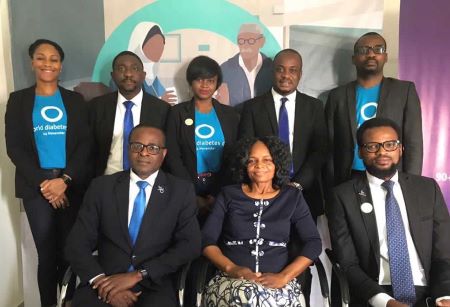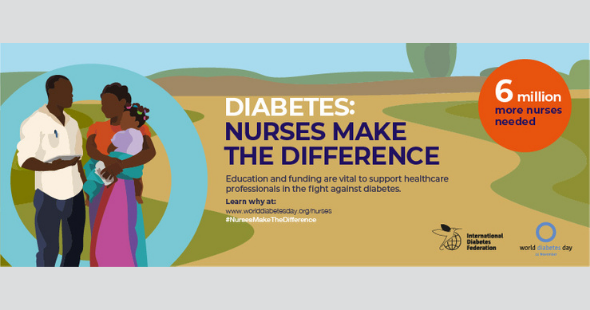-
Cost of antidiabetic drugs, monitoring devices now beyond reach of Nigerians

Worried by the increasing burden of diabetes in Nigeria and the spike in the number of people dying from the disease, healthcare professionals have called on the federal government to subsidize the cost of diabetes management, both medications and monitoring devices, to alleviated the sufferings of Nigerians living with the condition.
The healthcare professionals made the call while raising concerns over the high number of needless deaths from diabetes-related illness in a webinar organized by Novo Nordisk to mark 2020 World Diabetes Day, WDD.
All the speakers at the webinar submitted that the cost of antidiabetic drugs and monitoring devices have risen beyond the reach of many Nigerians living with the disease and most of them can no longer achieve diabetes control as recommended by the International Diabetes Federation.
Consultant Physician and Endocrinologist at the Lagos State University Teaching Hospital, LASUTH, Prof. Antonia Ogbera, said a lot of people, both children and adults have died because they cannot afford medications.
Speaking on the topic: “The rising burden of diabetes: the facts, the figures and the drivers of the disease in Nigeria” Ogbera said 19 million adults are living with diabetes in Africa and by 2045, the figure could rise to 47 million.
She said, “Globally, 463 million people have diabetes and by 2045, it is estimated that 700 million people will have it.
In 2015, she said about 5.0 million people died in Africa from diabetic mellitus.
She noted that South Africa and Nigeria are top countries in Africa with the highest cases of diabetes with 4.6 and 2.7 adults living with it respectively.
According to Ogbera, 63,958 were estimated to have died from diabetes-related disease in Nigeria and about 60 percent of diabetes mellitus in Nigeria are undiagnosed.
Speaking on the drivers she said: “The drivers of the epidemic in Nigeria are behavioural and lifestyle factors, urbanization and health system related issues.”
However, to cut the spike, Ogbera said diabetes screening and diagnosis at primary healthcare must be scaled up.
She said: “Scale up health education using different channels such as radio, television, print and social media.Treat patient to target, conduct national prevalence survey and ensure access to medication at primary care level,” Ogbera advised.
Also, a Consultant Endocrinologist and Diabetologist at the Enugu State University Teaching Hospital, ESUTH, Dr Ejiofor Ugwu, advocated subsidy for diabetes medications noting that the drugs are too expensive.
He observed that diseases such as HIV/AIDS and TB are currently being subsidized and wondered why diabetes which affect more people, also kills more people annually and with numerous serious complications is yet to be considered for subsidy by government.
Speaking on the topic-‘Diabetes Prevention and Control: Why multidisciplinary care and mult sectoral response are needed in Nigeria’, Ugwu said a lot of hands are required for the treatment of diabetes. He said it requires multidisciplinary care because it can’t be handled by one person alone but requires professionals from different range of disciplines to work together.
According to Ugwu, benefits of such collaborative effort will lead to good glucose-metabolic control.
He said: “It will help patient get motivated and involved in self care.”
And for the healthcare system, he said that it will ensure integrated approach to care leveraging skills and also reduce a number of patients to be hospitalized.
In her keynote presentation, Mrs. Adekunbi Ayanrinde Senior Nursing Officer and Diabetes Educator at Eko Hospital Lagos, charged nurses to continually examine their professional practice as a way of gaining experience and deep insight into providing quality diabetes care.
In his closing remarks, the Business Unit Head, Novo Nordisk English West Africa Mr. Jude Abonu said the company, in line with the ideals of the International Diabetes Federation, believes that nurses can make the difference as they provide the much-needed personalized care that people living with diabetes depend on.
He said Novo Nordisk, in collaboration with its partners, has sought to improve the lives of people living with diabetes in Nigeria through its Base of the Pyramid (BoP) project to ensure improved access to quality care and treatment for people in low-and middle-income countries.
The partners, he said, include local health authorities, the Christian Health Association of Nigeria and Roche Diabetes Care, over 60,000 people have been reached through awareness, education and diabetes screening in communities with over 15,000 patients registered at Diabetes Support Centers established in partnership with public secondary health facilities where diabetes support services are provided to patients.
“Novo Nordisk will continue to support the education and training of healthcare professionals and will engage in innovative partnerships that drive change to defeat diabetes. As a leader with over 90 years of experience in diabetes care, Novo Nordisk is committed to improving access to quality diabetes care for vulnerable populations in Nigeria,” he further said.

